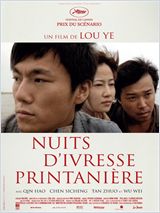
|
Spring Fever review
:. Director: Lou Ye
:. Starring: Qin Hao, Chen Sicheng
:. Script: Lou Ye
:. Running Time: 1:55
:. Year: 2008
:. Original Title: Chun feng chen zui de ye wan
:. Country: China, France
:. Official Site: Spring Fever
|
Never has a filmmaker so harrassed by authorities filmed with so much freedom. As for shaking up taboos, it's safe to say that Ye Lou knows how to go about it. Censured in 1994 for his first film, Weekend Lover, his second film Zuzhou River was banned. He himself was banned from making films in China for five years after Summer Palace was presented in Cannes in 2006, a love story set within the context of the events of Tienanmen Square in 1989. With Spring Fever the filmmaker attacks a new sulfurous subject: homosexuality, still considered a mental disease in his country.
But what's important here, above all, is the account of several love stories, complex as the most banal of lives. Ye Lou explains: "It was not a question of telling an out of the ordinatry love story, but a true story, an everyday story. One enters without a sentence, without a word, without a way in the surge of desire, in the urgency of the embrace, in physical love. In reality. Not disguised, made up, or magnified."
So the film begins: two men in a car who stop on the side of a road to piss, before giving themselves to eachother in the following scene. Alternately filmed with a certain distance, verging on discreet espionnage, to a more closely filmed intimacy of bodies, the protagonists, however, throughout the film deliver to the camera a truth which escapes them even during pleasure: a deep loneliness, an insoluble difficulty to wander, to float in a life filled with barriers set by aimless relationships. And when they don't end up losing themselves in each other's arms, in illicit clubs, in death itself, they literally disappear without leaving a trace, except for the mark of their pain.
What Ye Lou films with poetic power is this cruelty of feelings. A married man starts a relationship with a young male nightclubber, while the amateur detective the suspicious wife hires gets closer to his target before involving his own girlfriend in an threesome which none of them will leave unscathed. Served by the magnificent music of Peyman Yazdanian, by realistic, almost documentary-like dark photography by Zeng Jian, the film grabs you by the throat from the first sequences and plunges you into the slump that the characters are in, sometimes offering pure moments of melancholic grace, as in the karaoke scene, where there is no longer a question of sexuality, of war between the sexes, but love in the purest sense. Because Ye Lou controls the art of forgetting: in front of his camera, his characters forget themselves in order to better free themselves.
Like an excert from a Yu Dafu novel, the film offers a poetry without artifice, which speaks from within and is addressed to our inner core. One comes out of it with the bitter taste of loneliness but with the certainty of having seen a small jewel of truth.
Moland Fengkov

|
MAILING LIST
Get our reviews by e-mail
We'll never Spam you
|
|
|


